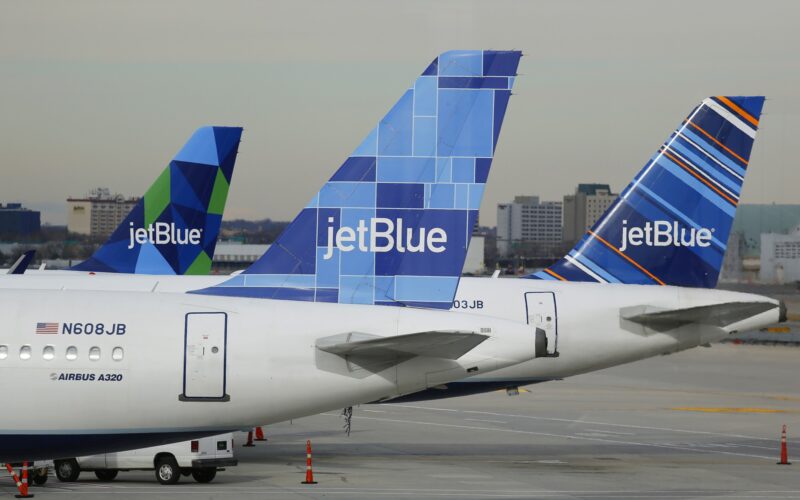With the United States Department of Justice (DOJ) set to sue and block the JetBlue and Spirit Airlines merger, the former outlined the competitive benefits of the two airlines becoming a single unit.
According to a report by Politico, JetBlue believes that there is a “high likelihood” that the DOJ will file a lawsuit against the merger “this week”. However, the airline still issued a press release, outlining the “procompetitive benefits of combination with Spirit”.
Pro-competitive merger benefits
Per JetBlue, which cited “updated data”, its merger with Spirit Airlines further supports the “disruptive” role of the airline. Thus, merging with the ULCC would have a “pro-competitive” impact against “higher-price legacy carriers” in the US.
The airline claimed that it was three times more effective than the carrier it is looking to acquire at bringing down ticket prices, a phenomenon it called the “JetBlue Effect” and said was cited by the DOJ.
“JetBlue’s unique combination of low fares and great service is a competitive force that keeps the legacy carriers on their toes and results in lower fares,” the New York-based airline said.
“With the scale unlocked by combining with Spirit, JetBlue will be able to bring down legacy carrier fares on more routes, benefiting more travelers than if JetBlue and Spirit continued as standalone airlines,” continued the air carrier.
JetBlue also pointed out that the two carriers do not compete with each other, as they “only overlap on 11% or less of the nonstop routes on which both of them fly”. To further reduce overlap, the new entity “made unprecedented upfront commitments to divest all of Spirit’s holdings in Boston and New York, as well as five gates and related assets at Fort Lauderdale” that would be allocated to other ULCCSs.
Thus, the merger and the continuing rapid growth of ULCCs “will assure increased competition and low fares”. JetBlue reiterated that the merger would alleviate the lack of competition in the current market, dominated by American Airlines, Delta Air Lines, Southwest Airlines, and United Airlines, the so-called Big Four airlines with about 80% of the market share in the US.
“JetBlue’s combination with Spirit allows it to create a compelling national challenger to these dominant airlines, while also ensuring ULCC options remain available in overlap markets,” concluded the airline’s release.
Differences in union opinions
While the DOJ could challenge the merger, the process also faces another obstacle: unions.
Spirit Airlines’ Association of Flight Attendants (AFA-CWA), representing over 4,600 cabin crew working at the ULCC “strongly” supported the merger in its latest tentative agreement signed with the airline on February 21, 2023. However, the Transport Workers Union of America (TWU), which represents JetBlue’s flight attendants and Spirit Airlines’ passenger service agents, stated that it strongly opposes the merger.
In a letter, addressed to Merrick Garland, the Attorney General of the DOJ, and Pete Buttigieg, the Secretary of the Department of Transportation (DOT), the union asked the two officials “that both of [their] departments take the necessary steps to prevent these airlines from combining until the leadership of the proposed carrier demonstrates their willingness to operate in good faith with their workers and the passengers”.
“We further have great concern that the proposed transaction may violate the applicable anti-trust laws and undermine market conditions and competition,” continued the letter, signed by John Samuelsen, the International President of TWU. Samuelsen pointed out that “workers and the traveling public at a combined carrier in certain parts of the country would face a de facto monopoly carrier and be subject to the whims of corporate greed.”
JetBlue’s pilots, represented by the International Air Line Pilots Association (ALPA), recently approved a two-year contract extension without opposing the merger. Commenting on the new contract, Captain Chris Kenney, the chair of the JetBlue unit at ALPA, stated that the extension “provides unprecedented pay increases for JetBlue pilots across the board and recognizes the contributions of JetBlue pilots to the success of this airline, including the planned merger with Spirit Airlines.”
“We entered into these negotiations recognizing that mergers take time. and our pilots couldn’t wait for the compensation improvements they have earned,” added Kenney.

